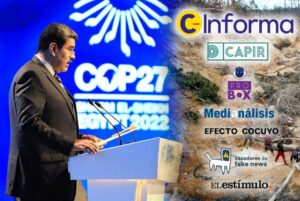It’s been said there is strength in unity. And in the case of disinformation, this saying fits like a glove. Not only for those who are behind the campaigns of creation of fake news but also for those who fight against them, since it has been shown that the phenomenon of disinformation is not organic and has behind it an organizational process with very clear aims.
A group of media and digital rights organizations in Venezuela created in November 2022 the fact-checking coalition C-Informa, which seeks to produce content to show how disinformation works in this South American country.
The participating members of this coalition are Medianálisis, Efecto Cocuyo, El Estímulo, Cazadores de Fake News and Probox, with the support of Consortium to Support Independent Journalism in the Region (CAPIR, by its Spanish acronym), and under the guidance of Chequeado from Argentina and DataCrítica from Mexico.
"The idea had been around for some time. We’d had conversations with some of the organizations about how to create a space where we could debate and explain to society how disinformation works. Then we had talks with The Institute for War & Peace Reporting (IWPR), who through the CAPIR initiative made it possible to create this coalition," Andrés Cañizález, director of Medianálisis, an organization that coordinates the editorial content of C-Informa, told LatAm Journalism Review (LJR).
"The first thing we did was to spend several weeks getting to know each other to understand what each one was doing in relation to fighting against disinformation. The idea was not to replicate what we were already doing, or to continue doing the same thing, but to see how this knowledge and expertise could be useful because, this time, news outlets and digital rights activists were joining forces. We’re betting this combination will produce positive things," Cañizalez said.
Venezuela is going through a complex economic, political and humanitarian crisis. For years, violations of the right to freedom of expression have been reported and the closure of news outlets has been documented. At the same time, the Venezuelan government has taken advantage of the reach of social media to disseminate its political propaganda, dismantle opponents, and divert or confuse the attention of the masses

Andrés Cañizález, director of Medianálisis, an organization that coordinates the editorial content of C-Informa.
"In Latin America there is a favorable climate for disinformation but, in the case of Venezuela, it’s been aggravated by the absence of major national news reference points. This is the opposite of countries where there is also a lot of disinformation, such as Brazil, but where they still have national media as a reference for society. These countries still have written press and radio that continue to set the tone," Cañizalez said.
“In the case of Venezuela, we’re experiencing the consequences of more than 20 years of a policy oriented towards official hegemony. This has resulted in a significant number of closed news outlets, censored media, and quite precarious connectivity. Therefore, getting your news through social media, from my perspective, is still very limited in the country," he said.
In one of the pieces published by the coalition, a statistical analysis of 489 verifications or fact checks published by the Efecto Cocuyo news outlet from March 2018 to November 2022 was carried out. They were able to map and conclude that politics, health, environment, scams, insecurity, and public services were the most common disinformation topics in the country. In addition, most of the fake news had been designed exclusively for Venezuela, although conspiracy theories and content with global interest also circulate.
C-Informa is not the first example of a fact-checking network among organizations in Venezuela. On one occasion, seven Venezuelan news outlets, coordinated by IPYS Venezuela and with the support of Probox, the Global Communication and Democracy Observatory, and EsTendenciaVzl, joined forces to combat disinformation during the parliamentary elections on Dec. 6, 2020.
C-Informa works on two dimensions: each one of the news outlets or organizations writes feature stories or investigations individually, but they also come together to carry out collaborative work.
Such was the case of the coalition's joint coverage of the participation of Venezuelan President Nicolás Maduro in the 27th United Nations Climate Change Conference (COP27) that took place from Nov. 6 to 18, 2022 in Egypt.

The coalition conducted joint coverage of the participation of Venezuelan President Nicolás Maduro in the 27th United Nations Climate Change Conference (COP27) .
"Our most relevant work has been about the official lying strategy in the case of the climate summit in Egypt, where we were able to uncover a dual discourse. President Nicolas Maduro outwardly defends the Amazon, the jungle, green policies, but inwardly there are a series of policies that are predatory of nature. For example, the whole project known as the Orinoco Mining Arc," Cañizalez said.
Among the individual works, it is worth mentioning the investigation carried out by C-Informa's Fake News Hunters where they confirmed how false websites and some possibly automated accounts (bots) were created to feign popular support for Alex Saab, a businessman linked to Maduro's government.
On the other hand, the fact-checking coalition collaboratively published, at the end of November 2022, a Glossary of terms related to disinformation. Readers can find in it the meaning of words or phrases related to fake news, such as Mis/Disinformation, Fake News, Spam, Fake Accounts, etc.
"There is a very positive energy, congeniality and synergy in this team. Recently, we made a glossary of terms associated with disinformation. This was important in this emerging path," Cañizalez said. "We’re very satisfied. This coalition is something we see as necessary because it’s not only about doing research on issues that affect society. We also want to show how disinformation works in this country. We play a journalistic role, but we can also play an educational or pedagogical role in society."